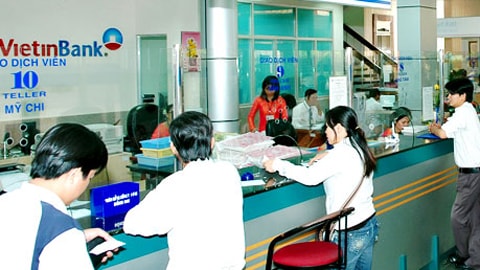The State will hold more than 65% of capital in state-owned banks.
The Government has just issued a Resolution on solutions to promote equitization and divestment of State capital in enterprises..Accordingly, the Prime Minister noted that for investment sectors that are unlikely to recover the full value of capital recorded on the books, full provisions for financial investment depreciation must be made according to current regulations and a divestment plan must be prepared and submitted to competent authorities.
 |
| Only Vietinbank is allowed to divest over 35% of state capital. (Photo: KT) |
The Resolution clearly states that in case the equitization and divestment progress of State capital cannot be carried out according to the plan approved by the competent authority, the Board of Members and the Board of Directors of the enterprise must clarify the objective and subjective causes, determine the responsibility of the collective and individuals and report to the competent authority for consideration and handling according to regulations.
Also in this Resolution, the Government allowed divestment of investment capital below par value or below the enterprise's accounting book value after deducting the provision for loss of financial investments according to regulations and on the basis of the divestment plan that has been considered and decided by the owner.
For the transfer of investments in unlisted joint stock companies with a par value of VND 10 billion or more, enterprises can choose to hire an intermediary financial institution (securities companies) to auction, or organize the auction themselves at the enterprise. In case the auction is unsuccessful, the enterprise reports to the owner for consideration and decides to sell by agreement.
Regarding divestment from financial investment companies and commercial banks of State-owned corporations and groups, the Government has also approved the possibility of assigning State-owned commercial banks to buy back or transferring the State Bank of Vietnam as the owner representative.
Accordingly, the Government requires corporations, groups and state-owned enterprises to base on classification criteria and their role in the development of the whole industry to determine the rate of maintaining state capital holding, but not exceeding 65%.
On the contrary, Bao Viet Group and joint stock commercial banks must still maintain a minimum of 65% of State-owned shares. However, the Government also stated that the Vietnam Joint Stock Commercial Bank for Industry and Trade (Vietinbank) alone is allowed to sell more than 35% of State capital.
In fact, at Vietinbank, the State holds 64.5% of charter capital. Bank of Tokyo-Mitsubishi UFJ (BTMU) holds 19.73% of capital.
At Vietcombank, state capital accounts for 77.11% and a strategic partner shareholder is Mizuho Bank (owning 15% of charter capital). Meanwhile, at the Bank for Investment and Development of Vietnam - the newest state-owned giant that has just listed on the stock exchange, there is up to 95.76% state capital.
If the resolution is clear, responsible units must implement the equitization and divestment schedule correctly. In addition, Ministers, heads of ministerial-level agencies and Chairmen of provinces and cities must also be responsible for any delay in completing the plan./.
According to -VOV.VN






